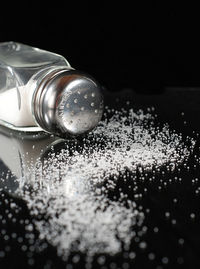Chloride
| See Also | Minerals |
|---|
Chloride is an important mineral involved in the regulation of the body's electrolyte balance, acid-base balance, and also is essential for proper nerve and muscle function. Healthy individuals do not need to be concerned about obtaining enough chloride; when eating a balanced diet, chloride needs are typically met. Patients who are extremely ill and have acid-base imbalance typically require careful monitoring of electrolyte levels and may need supplementation [1].
Contents
Food Sources
The following is a list of natural sources of chloride. For a more expansive list on food sources of specific nutrients visit Health Canada's Dietary Reference Intakes for Elements or USDA's National Nutrient Database
- salt substitutes (potassium chloride)
- sea salt
- table salt (sodium chloride)
Other food sources include:[2]
- grains: rye
- vegetables: tomatoes, lettuce, celery
- fruit: olives
- Other sources include: seaweed
Uses
The following are the primary uses for chloride: [1]
- Bartter Syndrome: Bartter syndrome is a group of disorders characterized by a widening of the ascending part of the loop of Henle in the nephron of the kidneys. The main features are low blood potassium, metabolic alkalosis, and high levels of calcium, chloride, and sodium excreted in the urine. Sometimes magnesium is low in the blood as well but this is rare. Supplementation with nutrients that are low such as potassium, sodium, and magnesium are often necessary [3].Individuals with Bartter syndrome may require additional amounts of chloride as well.
- Renal Tubular Disorders and Cystic Fibrosis: Individuals with renal tubular disorders and cystic fibrosis may require additional amounts.
Deficiency Symptoms
Chloride deficiency is extremely rare in North America except in those with acid-base balance disorders. Causes of deficiency may include:
- continuous vomiting
- infant formula preparation lacking chloride which can lead to:
- metabolic alkalosis
- hypovolemia
- significant urinary loss
- psychomotor defects
- memory loss
- growth retardation
Symptoms of chloride deficiency may lead to:
- unbalanced acids and bases in body fluids
- nausea
- vomiting
- confusion
- muscle weakness
- coma
Excess Symptoms
- unbalanced acids and bases in body fluids
- weakness
- confusion
- coma
Assessment Procedure
Best specimens to collect: [1]
Prescribing Considerations
- Chloride is available as sodium-chloride (salt) tablets. These may cause stomach distress and overload on the kidneys.
- Chloride is also a constituent in many multivitamin/mineral formulations [1] .
- The recommended dosages varies based on age and health status. To determine what your specific requirements are talk to your naturopathic doctor or other trained medical professional.
Safety
- General: Supplementation is not warranted unless there are significant alterations in acid-base balance in which case, medical supervision is required.
Drug Interactions
- Drug Interactions include: None reported [1]
Nutrient Interactions
- Nutrient Interactions include: [1]
